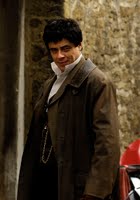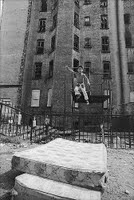
WARNING: I WILL SPOIL THE SHIT OUT OF THIS MOVIE. I could say this before every analysis... now is as good a time as any to start.
Nikita inhabits at least three roles in the course of the film. First, for a while, she is a defiant, destructive junkie, burnt out on her own energy. In this stage, she reminds me of Sid Vicious... the drug addiction, the violent outbursts, the short black hair and drawn face... and it makes me wonder how Sid would have fared in the program she entered. Presumably not so well, because Sid was not particularly intelligent, whereas Nikita has some sort of hidden potential that only Bob can see. With the personal interest he takes in her, one wonders if he hand-picked her from a bunch of hardcases he was following.
In fact, Bob brings us one of the most unique and poetic moments in La Femme Nikita, the dinner scene with Maria and Marco. Bob apparently improvises a whole life history for Nikita, which is heartbreakingly tender:
At 8 she was so pretty. She had golden hair in a pigtail. There was a cousin called Caroline. Only Caroline could touch her pigtail. No one else. She wore a ribbon and always had white dresses.It's never made clear whether he's projecting his love for Nikita into the vision of a young girl, or whether he's remembering his own life from before the agency. Nevertheless, it seems that here, where he's called upon to play a role, he can finally reveal the emotional stake he has in his protege.
I only saw her when the family rented a farm in the summer. With the cousins and neighbors, there were kids always causing trouble together. Marie had her specialty. She imitated frogs. She'd squat by the pond and jump into the mud, going, "Croak, croak." That cracked the other kids up. She'd come back soaked to the skin, but always with the same excuse: "I slipped," she'd say, in her quiet little voice.
Her second role is Josephine, which is the covert-ops sleeper agent. We see this personality born and gestated during her time at the training facility, which is highly compressed. In fact, most of our insight into this period is into her transition from Nikita to Josephine... her outbursts, her confrontations with authority, Bob's paternal guardianship, and her acceptance of responsibility. From that point forward, Josephine has to live between the lines, a vicious operative kept hidden away until she's needed.
Her third personality, Marie, is the "normal" life, created to fill the blank pages in Josephine's empty, purposeful world. Marie is an experiment with contentment, a game of autonomy within a space provided by her "employers." She is a ruse, an instrument of deception, but this is also the only life that gives Nikita/Josephine/Marie a chance at happiness. In this sense, Josephine is a prison for Marie, more so than the locked training facility was for Nikita.
Nikita says she is named after a song. She never says what song, but presumably it's the Elton John song of that title. It's a truly fitting lyrical piece for this character:
"Oh I saw you by the wall
Ten of your tin soldiers in a row
With eyes that looked like ice on fire
The human heart a captive in the snow."
...
And if there comes a time
Guns and gates no longer hold you in
And if you're free to make a choice
Just look towards the west and find a friend."
This is an ode to a woman who's the captive of her destiny, and it echoes with the voices of the men who love her but can't keep her. This is probably the most boring possible observation about La Femme Nikita, but reflecting on it makes the film come together, and reminds us how Luke Besson has a rare thing: a flair for action, and a healthy touch of sentimentality.
From the middle of the movie on, I wondered something about Nikita: why is it named after that first personality, the volatile junkie, when the character only has that name for about 10% of the film? The title started to seem inappropriate after a while, like an echo of the first few scenes, chosen without much regard for the actual arc of the character.
However, I think there's a reason to name the movie after Nikita: I think, through Josephine and Marie, Nikita is absolved of her sins and given another chance. It's important to hold out this hope... because when she leaves Marco, the character is leaving behind Marie, and when she leaves Bob, she leaves behind Josephine. At the end, she is alone, just as she was in the first moments of the movie, struggling through the throes of withdraw. Thus, there's no name left for her to return to but Nikita, purged in the fires of physical and emotional trauma, but at last allowed to start over.
Grittiness: 6
Nikita gets credit for starting out in a nihilistic criminal world, but ultimately, it turns toward covert ops action within the poetry of everyday life. Nikita goes through a merciless training program, and she herself is merciless, so the whole thing gets some points for that... but ultimately, it turns more toward personal drama than unflinching realism, and this is to its credit, I suppose.







